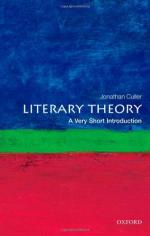
|
| Name: _________________________ | Period: ___________________ |
This test consists of 5 multiple choice questions, 5 short answer questions, and 10 short essay questions.
Multiple Choice Questions
1. According to Culler, poetry's imagery has the power of ____________.
(a) Support from scholars.
(b) Persuasion.
(c) Literary advancement.
(d) Judgment.
2. According to Chapter 7, a declarative statement that promises action can be defined as ________________.
(a) Performative viewpoint.
(b) Performative action.
(c) Performative utterance.
(d) Performative thought.
3. In Chapter 8, how is the true nature of a character often revealed in literature?
(a) Through a dramatic revelation.
(b) Through family.
(c) Through the past.
(d) Through personal challenges.
4. According to Chapter 5, how should poems be read?
(a) All at once.
(b) By the author.
(c) In private.
(d) In sections.
5. What is a typical theme in literature?
(a) Deliberate violence.
(b) Family demoralization.
(c) Character compassion.
(d) Character identity.
Short Answer Questions
1. What form of narration tells a story from an "I" point of view?
2. According to Culler, what do literary works offer their readers?
3. What era defined rhetoric as "the art of eloquence"?
4. According to some theorists, what idea was created by literature?
5. According to Nancy Armstrong, what is a product of 18th century novels?
Short Essay Questions
1. According to Chapter 7, who developed the idea of performative language?
2. During the Renaissance, what was the definition of rhetoric?
3. According to Chapter 8, in terms of the "I," what do literary theorists debate?
4. In terms of the "I," what do literary works offer?
5. What is the occasional confusion that results from the use of metaphor?
6. According to Chapter 5, what is rhetoric?
7. What is poetics, as explained by "Chapter 5, Rhetoric, Poetics, and Poetry"?
8. According to theorists, what gives the reader the most pleasure when reading a novel?
9. What is the ultimate goal of literary theory, according to "Chapter 8, Identity, Identification, and the Subject"?
10. Who believed that performative language had to be serious in order to set a standard?
|
This section contains 494 words (approx. 2 pages at 300 words per page) |

|




